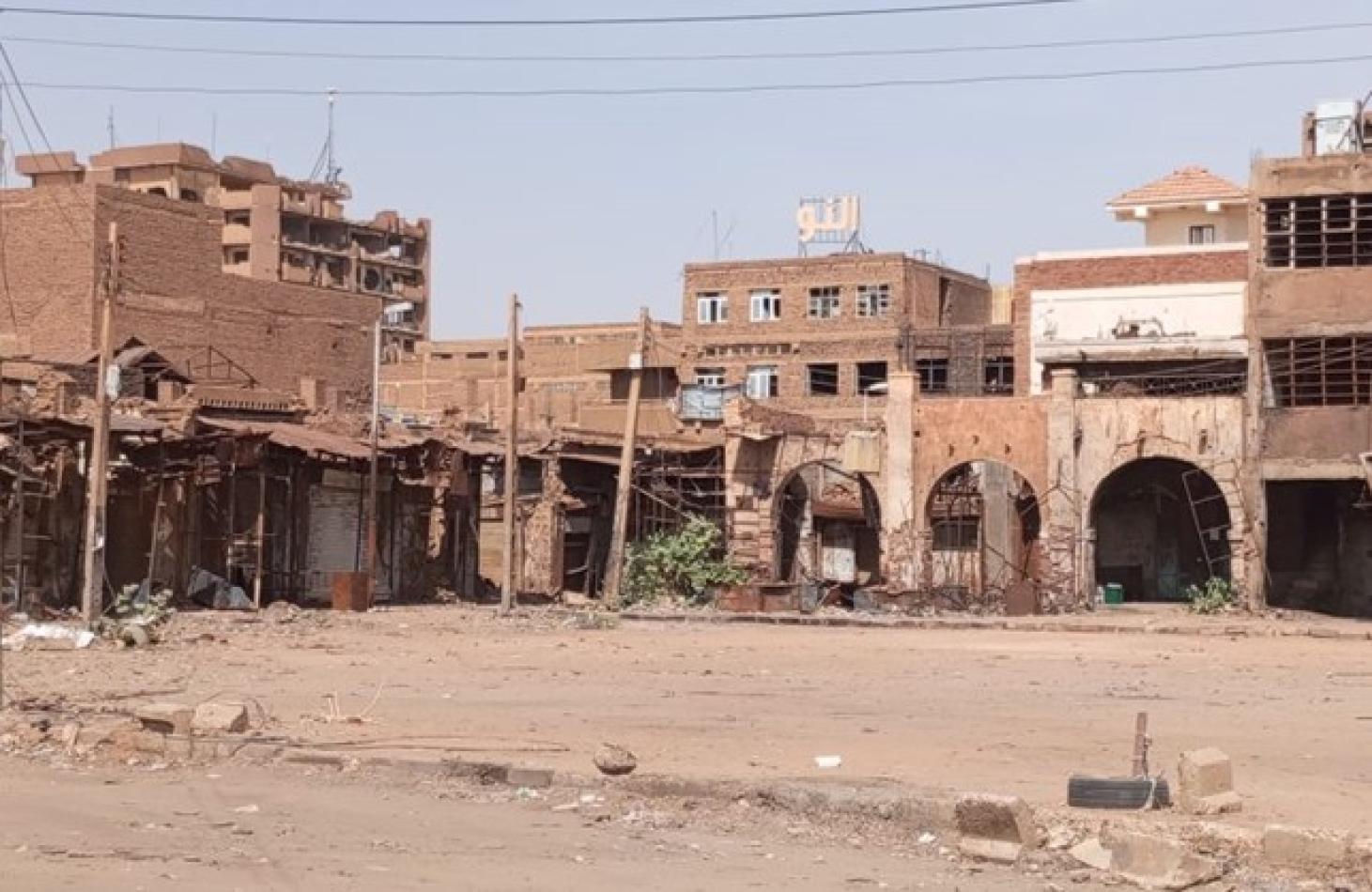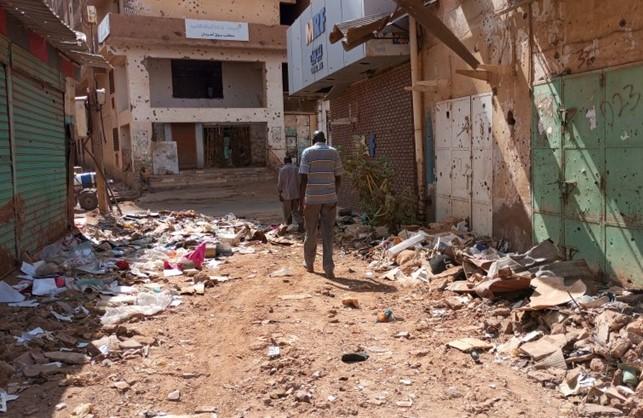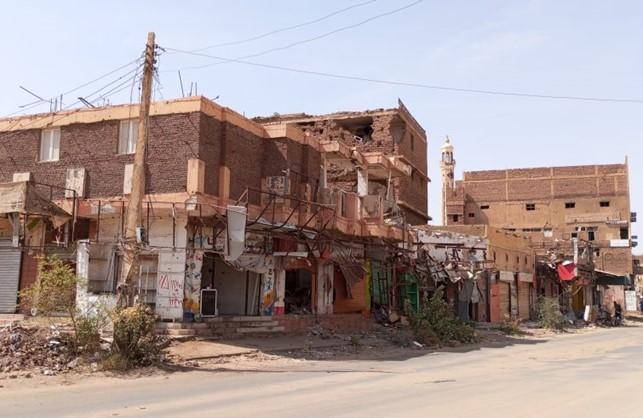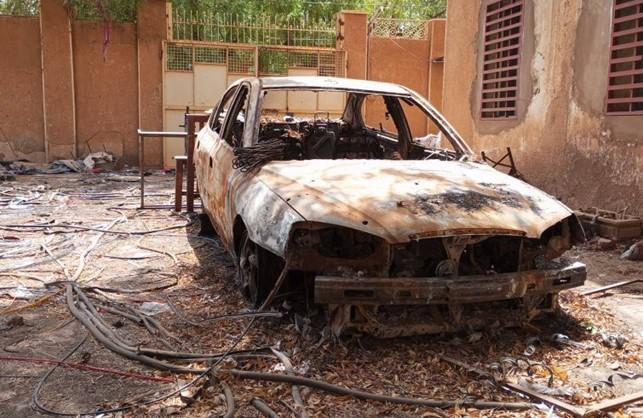Daniel Comboni
Comboni Missionaries
Institutional area
Other links
Newsletter
Friday, July 4, 2025
Over two years since the eruption of the conflict in Sudan between General al-Burhan's regular army and the paramilitary Rapid Support Forces (RSF) led by Hemedti, the country is on its knees. Negotiations are not taking place and there have been no serious attempts at mediation. [In the picture: Khartoum, Sudan. Foto: Diego Dalle Carbonare. SIR]
Darfur is under siege and Khartoum is a ghost town. Half the population are experiencing acute food insecurity with millions of people displaced. “A deep rift is forming, threatening to permanently divide the country. The prospects for peace are slim”. Prospects for dialogue or peace in the conflict that broke out in Sudan in April 2023 remain bleak.
In fact, recent events suggest that the country is drifting further apart, with the two opposing sides — the government army (SAF), led by Abdel Fattah al-Burhan, and the paramilitary Rapid Support Forces (RSF), headed by Mohamed Hamdan Dagalo (better known as “Hemedti”), the former deputy of al-Burhan — increasingly divided. The RSF is a rebranded name for the notorious Janjaweed militia, responsible for atrocities during the previous war in Darfur.
The SAF has recaptured the capital, Khartoum, and the city of Wad Madani, and now controls the eastern and northern regions. The RSF controls almost the entire western region of Darfur, as well as Kordofan and the Nuba Mountains. The conflict has spread to the Nuba Mountains, including the regional capital Kadugli, where the situation is extremely unstable. The RSF and SPLM-North have formed a political alliance known as Tasis (“foundation”), whose leadership was announced a few days ago. Hemedti is president of the alliance, while Abdelaziz Adam al-Hilu, leader of the SPLM-N (based in the Nuba Mountains), has been named vice president.
The army has agreed to a seven-day truce requested by the UN in El Fasher, but the RSF have rejected it because they are winning in El Fasher, Darfur. UN agencies report that half the population – 20 to 25 million people – are facing acute levels of food insecurity. According to the independent medical organisation Sudan Doctors Network, 239 children have died due to severe food shortages in Darfur over the past few days. An estimated 10.7 million people have been displaced within Sudan and a further 2.1 million have sought refuge in neighbouring countries. The situation is dire. There are no negotiations underway, nor are there any serious attempts at mediation.
The last attempt was made by Erdogan, but it failed to produce any results. Both sides seek the utter destruction of the opposing camp. Recent developments indicate that dialogue is off the table, and that the country is instead heading towards division. Darfur and Kordofan, specifically El Obeid and the Nuba Mountains, account for half of the country’s population.
“I’m afraid the conflict in Sudan could continue unabated for a long time.” Father Diego Dalle Carbonare, Provincial of the Comboni Missionaries in Sudan, spoke to SIR from Port Sudan. He has been living there for the past ten years in charge of a group of ten Comboni missionaries remaining in the country.
Life in Port Sudan. Since the outbreak of the conflict, his community, like all humanitarian organisations receiving assistance by sea, has moved from Khartoum to Port Sudan. There, it runs parishes, schools, and educational programmes. They have also opened a university branch. Two Comboni nuns have recently returned to Kosti and are exploring ways to resume their service. “We operate only in areas with a minimum level of stability, with no ongoing clashes,” he explains.
The conflict “has us grappling with daily emergencies, including the plight of refugees, homelessness, unemployment, and the scarcity of essential medicines. We help as we can on a case-by-case basis.”
Inflation has soared, as have the costs of living. The country’s public education system is in crisis, and its healthcare infrastructure has collapsed. Seventy-five per cent of the country’s physicians were based in Khartoum, which is now a battlefield. “Many hospitals were forced to close, and many doctors left the country,” he explains. “Even here in Port Sudan, it is difficult to find qualified personnel.”
The conflict spread to Port Sudan, though not as severely as to Khartoum, El Obeid and other cities, where paramilitary forces roamed the streets and broke into people’s homes. “In the first half of June, there were attacks every night for two weeks in a row”, he says. “Surgical strikes were carried out, with military and government buildings being targeted. Fortunately, there were no civilian casualties. Naturally, the sound of gunfire at night is unpleasant, but life in the city continued. Schools were closed for three or four days, but then they reopened.
Attacks are now continuing on a less frequent basis. Every now and then we hear gunshots and explosions during the night.
We don’t know whether what we hear is the sound of drones hitting their targets or anti-aircraft fire intercepting them. Fortunately, no civilians have been hit and no buildings have been destroyed so far.”
Khartoum is a ghost town. In contrast, Sudan’s army has almost regained full control of the city. A few weeks ago, the Comboni missionaries travelled there to check on the situation of the missions they fled two years ago. They were welcomed by the local population but had to undergo vaccination against cholera, which had spread throughout the city. “There are still some areas of turmoil where sporadic clashes are taking place, but on a very limited scale. The city centre is accessible, but it is deserted,” reports Father Dalle Carbonare. “It’s a ghost town. It’s frightening. There is not a soul to be seen.”
The internally displaced persons have not returned. Instead, people are returning to the suburbs, to Omdurman and North Khartoum. “Those with homes or property are returning to rebuild and repair them. However, the situation in the city centre remains unstable. The paramilitary have severely damaged the electricity infrastructure by tearing up cables and electricity poles, and stealing copper and iron wherever they can. It will take years to restore electricity. Without electricity, there is no water and the city is paralysed. Mobile phones only work where there are generators or minimal coverage.”
The situation in Darfur, especially the city of El-Fasher, is desperate. El-Fasher has been under siege by the RSF almost since the start of the war. A South Sudanese-born diocesan priest was killed two weeks ago: “A rocket hit what little was left of his house, which had been hit several times in recent months. The priest was trapped inside for months and could not escape because the entire city is surrounded by the RSF.”
Meanwhile, the United States imposed sanctions in response to the alleged use of chemical and biological weapons against civilians by the Sudanese army. The sanctions include a near-total freeze on US assistance to Sudan, except for emergency humanitarian aid, which will be assessed on a case-by-case basis. “Humanitarian aid is already trickling in.” US measures include a total ban on the sale and financing of military equipment. However, this stance is unclear, given that the Sudanese army obtains its weapons from Turkey and Iran. The conflict in Sudan also has a regional dimension, with the United Arab Emirates and Saudi Arabia supporting opposing sides. It is unlikely that the United States will openly side against the United Arab Emirates.
Gold trade, mineral extraction and rare earths are the financial drivers behind the conflict. Gold mining, which is entirely illegal and involves smuggling, has increased significantly since the start of the war. These mines are basic, hand-dug tunnels where miners enter and often never emerge again. Just a few days ago, a mine collapsed in Atbara, an area under army control, resulting in an estimated 50 fatalities.
Patrizia Caiffa – SIR







